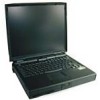Dell Inspiron 7000 Dell Inspiron 7000 Reference and Troubleshooting Guide - Page 83
Diagnostics Menu, Run Quick Tests, Run All Tests, Run Spe, cific Tests
 |
View all Dell Inspiron 7000 manuals
Add to My Manuals
Save this manual to your list of manuals |
Page 83 highlights
After you complete the preliminary instructions specified in the previous section, follow these steps to start the diagnostics: 1. Install a combination module in the options bay. 2. Turn off the computer. 3. Place the Dell Diagnostics Diskette in the diskette drive and boot the computer. NOTE: Before you read the rest of this chapter, you may want to start the Dell Diagnostics so you can see the menus on your display. When you start the diagnostics, the Dell logo screen appears, and a program tests the random-access memory (RAM) that will be used by the diagnostics. If a failure in RAM is detected, a message appears on the screen telling you the memory address of the defective memory module. Write down the memory address and see Chapter 5, "Getting Help," for instructions on obtaining technical assistance. If no errors are found in RAM, the diagnostics loads and the Diagnostics Menu appears (see Figure 4-1). The menu allows you to exit to the MS-DOS prompt. Dell Computer Corporation Dell Inspiron 7000 Diagnostics DIAGNOSTICS MENU Run All Tests RUn Quick Tests Run Specific Tests Exit To MS-DOS For a quick check of your system, select the Run Quick Tests option. This option runs only the subtests that do not require user interaction and that do not take a long time to run. Dell recommends that you choose this option first to increase the odds of tracing the source of the problem quickly. For a complete check of your system, select the Run All Tests option. To check a particular area of your system, select the Run Specific Tests option. Running the Dell Diagnostics 4-3















